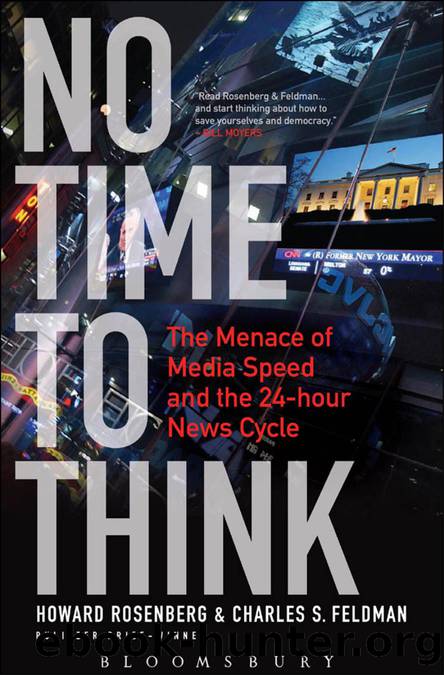No Time to Think by Rosenberg Howard;Feldman Charles S.;

Author:Rosenberg, Howard;Feldman, Charles S.;
Language: eng
Format: epub
Tags: Stories
Publisher: Bloomsbury Academic & Professional
Published: 2019-11-23T00:00:00+00:00
Chapter 6
âIn-Depth Instant Resultsâ
âWhat would you do, in the eyes of Muslims, to repair Americaâs image? Mayor Giulianiâ90 seconds.â
âA question from Anderson Cooper during the CNN-YouTube GOP candidate debate on November 29, 2007
âHow do you repair the image of America in the Muslim world?â30 seconds to respond.â
âCooper asking another candidate to respond to Giuliani
They were juiced, pumped, goosed, buzzed, crazed, revved up, hopped up, bouncing off the walls, hearts thumping like Tom-Toms. They were sizzling, on fire, tongues blazing. They were unbuckled and unstopped, running and gunning, jet-powered zombies roaring faster and faster, blowing over speed bumps and through red lights, rolling, rolling, rolling, wind at their backs, adrenaline in their tanks.
Rarely have so many filled so much time saying so little with so much conviction.
It seems almost a paradox that extreme speed would have colored the coverage of a presidential election season as swollen and tortuously drawn out as the 2007â2008 one in the U.S. As 60 Minutes grouch Andy Rooney cracked, âItâs the earliest we got tired of the next election.â
There was speed in reporting primary and caucus results, often before there were results to report. There was speed in candidate debates that undermined their potential to inform the public. There was speed all across the board, none of it contributing to a level of knowledge that would help voters decide which candidate to support for reasons beyond the superficial.
The candidates were visibly exhaustedâand voters at once energized by some of the historic choices before them and fed up, grumbling about the exaggerated length of a grueling odyssey that awkwardly straddled 2007 and 2008 like an obese dancer attempting a split. It was the earliest starting presidential campaign in U.S. history, but a toss-up as to what irritated Americans most, its length or the sped-up campaign narratives thrust at them by much of the media coverage.
Nearly every election finds candidates with track records flip-flopping their positions to gain an edge with voters, and getting attacked for it. But the screeching media U-turns between early Januaryâs Iowa Caucuses and the New Hampshire Primary were especially amazing, a stunning flip-flop for the ages.
Virtually overnight, Hillary Clinton went from being the media-pronounced Democratic front runner on the eve of the Iowa Caucuses to being the media-pronounced hapless also-ran whose campaign was in collapse. (So why didnât she get out of the race and go back to New York, already, so the media could get on with their early worship of Barack Obama?)
Five days later she had boomeranged, again becoming the media-declared front runner when winning the New Hampshire Primary. During this same period, Obama experienced a media-driven reverse metamorphosis, going from underdog ⦠to soaring Zeus ⦠then back to underdog, but only after much of the coverage had blown it again.
Wrote Howard Kurtz in the Washington Post, âThe coverage had been so out of control there was speculation about when Hillary might have to drop out. Polls giving Barack Obama an 8-or 10-point lead were accepted as fact. The news surrounding the former First Lady had been uniformly negative for days.
Download
This site does not store any files on its server. We only index and link to content provided by other sites. Please contact the content providers to delete copyright contents if any and email us, we'll remove relevant links or contents immediately.
| Direction & Production | Genres |
| Guides & Reviews | History & Criticism |
| Reference | Screenwriting |
| Shows |
Head of Drama by Sydney Newman(2025)
Robin by Dave Itzkoff(2013)
I'm Judging You by Luvvie Ajayi(1893)
The Paranormal 13 (13 free books featuring witches, vampires, werewolves, mermaids, psychics, Loki, time travel and more!) by unknow(1850)
Single State of Mind by Andi Dorfman(1516)
Ten by Gretchen McNeil(1502)
#MurderTrending by Gretchen McNeil(1399)
Key to the Sacred Pattern: The Untold Story of Rennes-le-Chateau by Henry Lincoln(1354)
Most Talkative by Andy Cohen(1312)
Merv by Merv Griffin(1268)
This Is Just My Face by Gabourey Sidibe(1182)
Notes from the Upside Down by Guy Adams(1180)
Jamie Oliver by Stafford Hildred(1148)
The Hunger Games: Official Illustrated Movie Companion by Egan Kate(1122)
Springfield Confidential by Mike Reiss(1108)
Clarkson--Look Who's Back by Gwen Russell(1080)
The TV Writer's Workbook: A Creative Approach To Television Scripts by Ellen Sandler(1075)
Blue Planet II by James Honeyborne & Mark Brownlow(1022)
Dark Angel by D. A. Stern(1016)
